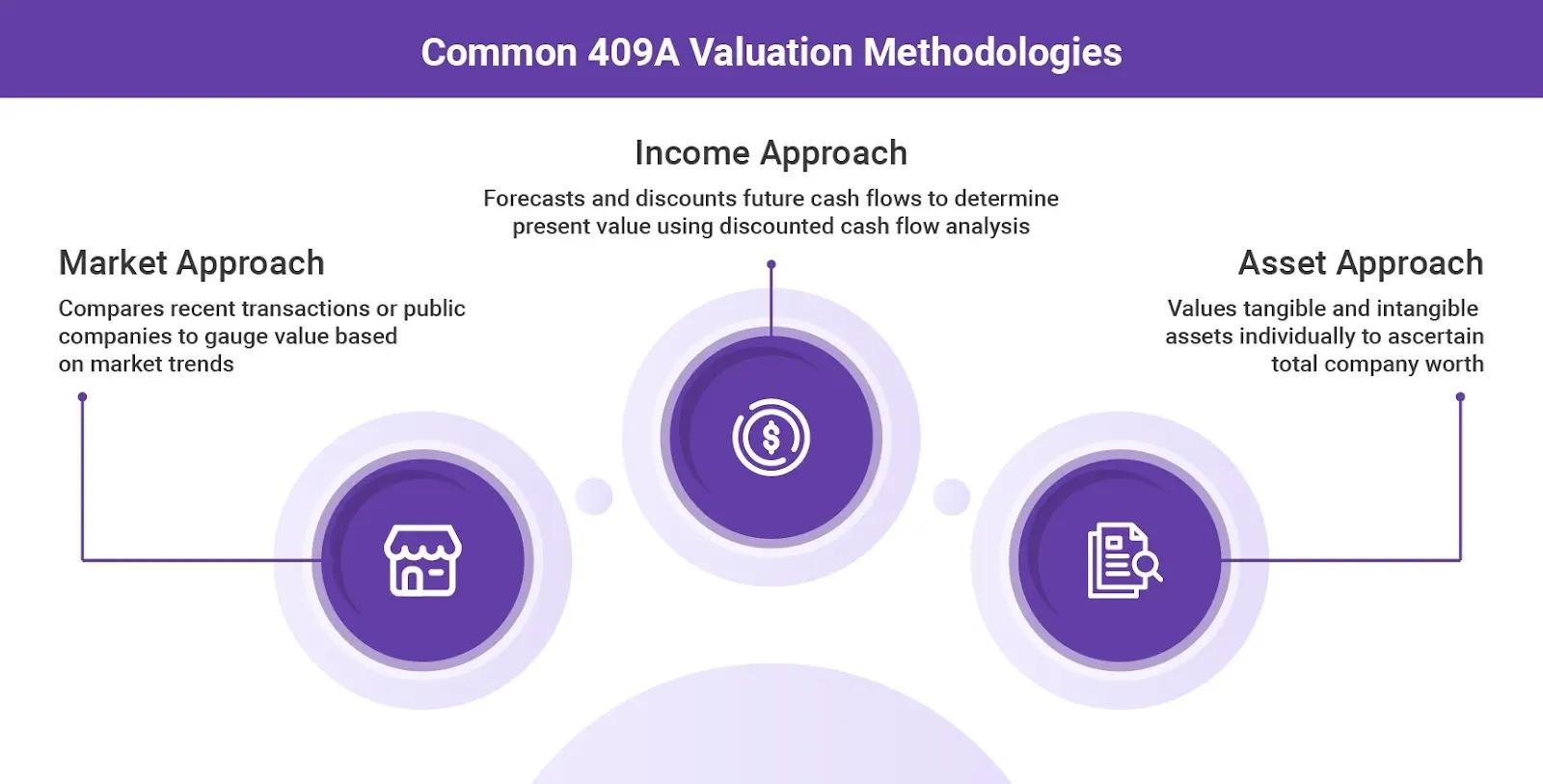409 A Valuation Vs VC Valuation: Know The Difference
Wondering about the 409A valuation vs. VC valuation? What is the meaning of post-money valuation? Learn more about these important valuation methods here.


Starting a company from scratch is very exciting, but the complexity of managing equity can easily get out of hand. One crucial element that often raises questions is the 409A Valuation. This article aims to answer all your questions about Startup 409A Valuation so you can confidently manage your startup's stock options.

A 409A Valuation is an independent assessment of the value of a private company's stock (Fair Market Value), typically conducted by a third-party appraisal firm. It's crucial for startups in the US to grant stock options to employees. The 409A Valuation establishes a benchmark for the strike price or exercise price of stock options.
It also helps ensure the company complies with IRS regulations and protects both the company and employees from potential tax issues.
Some of the preferred valuation methodologies include the asset approach, the income approach, and the market approach.

There are two main reasons why a startup needs a 409A Valuation:
IRS Requirement and Tax Compliance: The Internal Revenue Service (IRS) mandates 409A Valuations for any agency granting stock options as deferred compensation to employees participating in a US-based equity plan.
The 409A Valuation helps ensure the company complies with tax regulations surrounding stock options. In case there is no proper assessment, the IRS can challenge the strike price set for employee stock options thereby attracting tax penalties against both the employer as well as employees.
Safe Harbor Protection: A compliant 409A Valuation provides a “safe harbor” under which the company will not be penalized by the IRS. This indicates that should the IRS challenge this valuation in the future, the company will not be charged, provided it followed reasonable evaluation practices and did so in good faith.
In short, a 409A Valuation keeps both startups and their employees away from possible tax headaches and also makes sure everyone is on board regarding the value of stock options and the stock price.
If your startup doesn’t get a 409A Valuation, it is exposed to various risks, including:
Tax Penalties: The IRS may impose penalties on both the company and its employees if the strike price for stock options isn't set based on a Fair Market Value established by a qualified 409A Valuation. This could result in significant tax liabilities for everyone involved.
Loss of "Safe Harbor" Protection: A compliant 409A Valuation provides "safe harbor" protection. This means that even if the IRS questions the valuation later, the company avoids penalties as long as it follows a reasonable valuation method and acts in good faith. Skipping a 409A Valuation eliminates this protection, leaving the company and its people vulnerable to potential challenges and penalties.
Fundraising Difficulties: Investors often view a lack of proper legal and financial compliance as a huge red flag. Skipping a 409A Valuation might raise concerns about the startup's financial transparency and overall management practices, making it difficult to attract potential investors in future fundraising rounds.
Yes, there are multiple scenarios in which 409A Valuation applies to startups outside the US, thanks in part to the American Jobs Creation Act (AJCA). If your startup is registered outside the US and has US citizen employees (irrespective of their residence status), 409A regulations come into play when granting them stock options.
Employees who are lawful permanent residents of the US (green card holders) working for your non-US startup also fall under 409A if you offer them stock options.
Lastly, even if your foreign employees are not US citizens or residents, they might still be subject to 409A if they earn income sourced from the US, such as working for your US subsidiary or receiving compensation in US dollars.

If you're an international founder with US employees and plan to offer stock options, you'll need to comply with 409A Valuation requirements. Here are two approaches you can take:
Establish a US Entity for Valuation: Setting up a separate US legal entity for your US operations can simplify the 409A Valuation process. This entity could hold the stock options for your US employees, and the valuation would focus solely on the fair market value of that US entity.
Work with a Specialized Valuation Firm: You can work directly with a valuation firm experienced in handling 409A Valuations for startups like yours. These firms understand the nuances of such situations and can guide you through the process.
There are multiple material events for a 409A Valuation. However, the most significant material changes occur when a startup issues its first stock options and before a major funding round.
Whenever your startup plans to grant stock options to employees (for the first time or to new hires), you'll need a 409A Valuation to establish a fair market value for setting the strike price of those options. And since fundraising rounds can significantly impact a company’s valuation, it is advisable to get a fresh 409A Valuation done. Other events, like mergers, acquisitions, liquidity events, etc., also require a 409A Valuation for startups.
Ideally, a startup should get a 409A Valuation at least once a year (every 12 months) as a best practice. This annual refresh helps ensure the strike price for employee stock options stays aligned with your company's evolving value.
However, a valuation is also recommended when giving out your first stock options and during major funding rounds.
Yes, since funding rounds lead to the injection of new capital, it is highly recommended to get a fresh 409A Valuation done. This helps maintain alignment between the price employees pay for stock options and the company's current market perception.
409A Valuations are conducted by qualified third-party valuation providers specializing in business valuations. These firms employ experienced appraisers who meticulously analyze your company's financial data and consider various factors to determine a fair market value.

While technically possible, it's not recommended for individuals to conduct their own 409A Valuation. Accurately determining fair market value requires expertise and adherence to IRS regulations. Partnering with a qualified 409A Valuation firm ensures a credible and defensible valuation.
A 409A Valuation typically costs a few thousand dollars. However, the exact price depends on your company's complexity.
Startups with a simple structure and limited funding history can expect a lower cost, while those in a different stage might pay a bit more. The valuation firm's experience and the level of detail required in the report also affect the price. Don't prioritize the cheapest option— focus on finding a reputable 409A Valuation firm with experience in your industry that offers a transparent fee structure and clear communication.

The timeframe for completing a 409A Valuation can range from a few weeks to a month, depending on factors such as the complexity of the business, the availability of necessary financial documents, and the workload of the valuation firm.
Here’s what you need to provide for accurate valuation:
There are a couple of reasons a 409A Valuation might seem lower than expected. Firstly, it focuses on fair market value, which considers the risk and lack of liquidity inherent in a private company. Unlike public company stocks with constant market activity, private company shares are less certain investments.
Secondly, the valuation aims to be conservative in complying with IRS regulations. This can sometimes lead to a lower valuation than founders might anticipate based on their future growth plans.
While a low 409A Valuation isn't always ideal, it may not necessarily have a massive impact on a startup's ability to raise funds. Investors primarily focus on a startup's growth potential, financial performance, market opportunity, and other factors. However, a significant difference between the 409A Valuation and the valuation sought in a fundraising round could raise concerns.
While both investor valuation and 409A Valuation look at the same company’s value, the purpose of each is different. A 409A Valuation aims to determine the fair market value of the company’s stock at a specific point in time, mostly early stage. On the other hand, investor valuation focuses on a startup's future potential to determine how much they're willing to invest. Here is a detailed article describing the difference between 409A valuation and VC valuation.
The strike price of a stock option is the pre-set price an employee pays to purchase a share of company stock if they decide to exercise their stock option. It is like an employee discount on the stock.
The 409A Valuation is related to the strike price because it helps determine the fair market value of the company’s common stock price. This fair market value is then used to set the strike price of the stock options.
Technically, a 409A Valuation is not mandatory until you decide to issue stock options. However, we strongly recommend it as it establishes a baseline for future equity compensation and simplifies the process when you're ready to offer stock options to employees.
No, the IRS doesn't explicitly require a 409A Valuation solely for founders when offering stock options. However, a proper valuation protects both the company and the founders from potential tax issues down the road. Additionally, having a 409A Valuation in place ensures that the stock options granted to founders are set at a fair market value.
If your startup pivots (let's say, to a new business model) after a 409A Valuation, it can impact the valuation. It is advisable to get a professional opinion on whether you need to get a fresh 409A Valuation to ensure that the strike price of the stocks remains accurate. Also, having an updated 409A Valuation can help maintain transparency with your company's various stakeholders.
Having well-organized records is an important part of the 409A Valuation process. Without the right records in place, the valuation firm can face difficulties in doing due diligence and ascertaining the value accurately. It can also lead to a longer 409A Valuation process. Most importantly, it can make your entire startup look unprepared and unprofessional.
To help you gather all the documents you need, we’ve created a checklist you can use today to stay organized.

We usually do not recommend using old valuations— a company’s value changes constantly. However, the IRS generally allows the use of a previous valuation for a limited time, typically within a quarter or six months, depending on various factors such as changes in the company's financial condition, market conditions, or significant events affecting its value.
Yes, a 409A Valuation can be used for purposes other than stock options issuance. It can establish fair market value in mergers and acquisitions, set values for employee compensation, facilitate internal corporate transactions like buybacks, etc. However, it may not be suitable for all situations; consulting with a professional is recommended.
The IRS website is a great resource for learning more about 409A Valuation. You can also follow our blog for regular updates, insights, and practical tips on navigating the complexities of 409A Valuations and other relevant topics in startup equity management.
We highly recommend consulting with a financial advisor for your 409A Valuation needs. They can guide you through the complexities, ensure proper compliance with IRS regulations, help interpret valuation results, and help with strategic decision-making.
Managing a startup's equity effectively can be complex, but Qapita can help. We offer a comprehensive suite of equity management solutions designed to simplify the process for founders and startups.
Tailored Valuation Reports: Our team creates meticulous valuation reports specific to your company's needs, ensuring they accurately reflect your startup's fair market value.
Compliance Expertise: We adhere to recognized accounting standards like IGAAP, IFRS, and SFRS, providing peace of mind that your valuations comply with regulations.
Focus on Your Business: With Qapita's user-friendly equity management tools, you can streamline equity administration and focus on growing your startup.
Contact us to explore how Qapita can empower you to manage your startup's equity efficiently and compliantly.